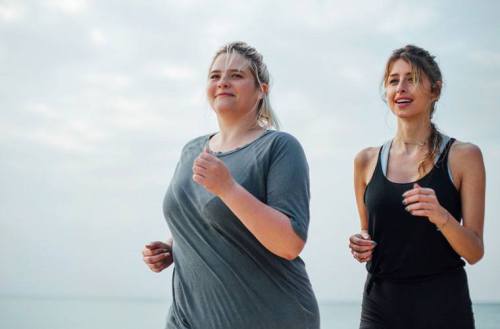Which workout is better for you: running or spinning?
Two top fitness trainers weigh in on the pros and cons of each exercise when it comes to goals like toning, burning fat, boosting your mood, and more.

Deciding whether to tap it back or pound the pavement can be as tough a question to answer as what Sex and the City character you are, which is why having experts weigh in on the pros and cons of both popular workouts can be helpful. So, should you be clipping in or lacing up your sneakers? Turns out, like so much of life, the answer is complicated.
That’s because each exercise offers plenty of healthy body (and mind) benefits. “A lot of the same muscle groups are worked in both—just in different manners,” says Vinnie Miliano, a certified run coach at Mile High Run Club in New York City. Really, when it comes to deciding which is best for you, it’s all about your goals.
Below is a breakdown of how running and spinning compare when it comes to toning, amping up your metabolism, boosting your mood, and more healthy indicators.

To tone your total body: running
Both exercises are great for your legs, glutes, and thighs. But “core stabilization plays a much stronger role in running than in spinning and takes a lot more work to strengthen,” Miliano says. “Arms also play bigger role as a lot of propulsion comes the chest and lats and general arm mobility.”
To increase your metabolic rate: spinning
The high-intensity intervals in a spin class “create an oxygen deficit, which the body makes up for in recovery time,” says Alex Robinson, managing lead instructor at Flywheel Sports, who’s also a certified personal trainer and performance enhancement specialist. It’s called excess post exercise oxygen consumption, or EPOC, and it may last for up to 36 hours after the workout. “This means you’re burning extra calories during rest for up to a day and a half,” he explains.
To boost your mood: both
Any cardio junkie will admit that the post-workout endorphin rush is downright addictive—and there’s plenty of science to support the healthy benefits physical activity has on your emotions. “Clinical trials have successfully used exercise to treat anxiety disorders and depression,” Robinson says. “Exercise reduces the body’s levels of stress hormones like adrenaline and cortisol.” Translation: You’ll feel happier overall whether you run or cycle. Win-win.
To keep your brain healthy: both
Worried about dementia or memory function? Working out is a sure way to boost brain power. Robinson points to a study by the Proceedings of the National Academy of Sciences; it found that aerobic exercise actually increases the size of the hippocampus, a part of the brain that shrinks in late adulthood and can reduce memory function.
To reduce physical wear and tear: spinning
Spinning is generally considered easier on the body, particularly the knees. “Cycling is lower-impact and helps protect joints and keep you going for longer,” Robinson says. Sounds like a winner.
Boost your cardio IQ! Find out how long you actually need to run to get the most benefits, and how much cardio is too much.
Sign Up for Our Daily Newsletter
Get all the latest in wellness, trends, food, fitness, beauty, and more delivered right to your inbox.
Got it, you've been added to our email list.










